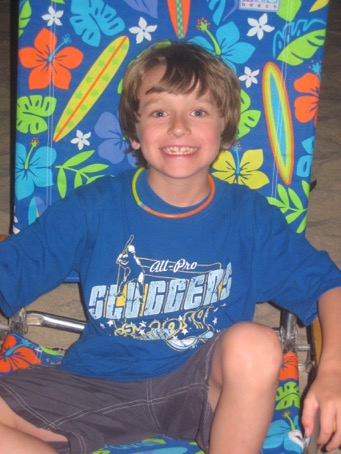When you say, “My son/daughter has autism” people don’t know how to respond. Most folks know not to say, “Woo hoo!” and high-five me, so instead they fumble for their speech, they turn their gaze away, they make horrible social blunders, and then quickly try to escape an uncomfortable situation.
We get it. We know you are at a loss for words. We know you don’t know what the right response is. We know you feel awkward, unsure and really, really wish you had never stared rudely and commented on our child’s behavior, but once the cat is out of the bag, you can’t pretend you didn’t let it out. And neither can we.
So during this month of Autism Awareness, I thought I could help those awkward, at-a-loss-for-words people out as much as I could. Seeing as how every situation is different and every child with autism is different, I might not be able to tell you exactly what to say, but, I can give you some helpful hints on what not to say.

1. “But he looks so… normal?!”
Um, OK… thanks? I’m not exactly sure what “normal” looks like, but, I think my kid is gorgeous.
2. “Are you sure he’s autistic?”
Yes, I’m sure. I realize if he isn’t spinning, flapping, asking to watch Judge Wapner or yelling, “Bazinga,” he may not seem autistic to you, but, the 200 specialists we have seen, trying to reassure ourselves of that very question, confirmed that he is indeed autistic.
3. What do you think caused it?
We don’t know. We wonder, we question and we agonize over everything we did, everything we ate, and every place we went while pregnant. We spend countless hours blaming ourselves, the environment, genetics, etc., then we finally realized, what caused our child’s autism isn’t nearly as important as what we are doing to support him. We want you to realize that, too.
4. “Ohhhhh… what can he do?”
I said that he has autism, not that he’s a circus monkey. We realize that there are misconceptions that all people with autism have some sort of exceptional ability, and although some do, some do not. So when you ask a mother this, not only does it reinforce that her child is “different” in the neurotypical world, it makes her feel like her child is “different” in the autistic world, too, so just don’t.
5. “Maybe if you just provided him with some discipline.”
Duck. If you say this, then either wear a face mask or duck very, very quickly.
Autism is not caused by poor parenting or a lack of discipline and what you are witnessing is not a temper tantrum. What may look like an “I’m not getting my way” tantrum is a sensory meltdown by a child who cannot tell his mother what is hurting him, how he feels or how to help him. This inability to help our child already feels like a punch in the gut; don’t add to our pain with your ignorance and judgments.

6. “I try to talk to him, but, he always ignores me. Maybe you should get his hearing checked.”
We have. He is not deaf. He hears you. He sees you. He knows you are there. Just like he knows when you don’t see him, when you don’t hear him and when you give up on him. Just because he does not speak to you, does not mean he isn’t trying to communicate with you.
7. “Maybe he just likes to be alone.”
He may “prefer” to be alone, but, that doesn’t mean he “likes” to be alone. Being alone is easier than trying to understand facial expressions, body language and conversations that are difficult to understand. Watching them be alone hurts, having people assume they “like” being alone, and letting them be alone, hurts even more.
8. “He’s not that bad.”
I didn’t say he was bad. I didn’t say he was broken. I didn’t say how he sees the world is wrong. I said he has autism. “Different” is not “bad.”
9. “He’ll eat when he’s hungry.”
No. He. Won’t. (Duck again.) And let me ask you, would you test your child with this theory? Would you wait him or her out for days and days to see how hungry he gets before he will eat what is put in front of him and not the food his sensory system tells him he needs?
10. “You are so… [insert amazing, brave, strong, loving, etc. here].”
No, I’m not, but, he is.
11. “I’m sorry.”
Don’t be, I’m not (most days).
12. “Will he always be like that?”
Will he always have autism? Yes. Will autism always impact his life in some way? Yes. Will he always see the world a little bit differently? Yes. Will he continue to grow, live, love and find joy while teaching me to see his world? Yes. And that’s why we don’t want you to be sorry.
Saying The A Word is hard. Responding to The A Word is hard. Educating yourself about The A Word is not. Thanks for taking the time to do so.
A longer version of this post appeared on The AWEnesty of Autism.
The Mighty is asking its readers the following: Describe the moment someone changed the way you think about disability and/or disease. If you’d like to participate, please send a blog post to community@themighty.com. Please include a photo for the piece, a photo of yourself and 1-2 sentence bio.
